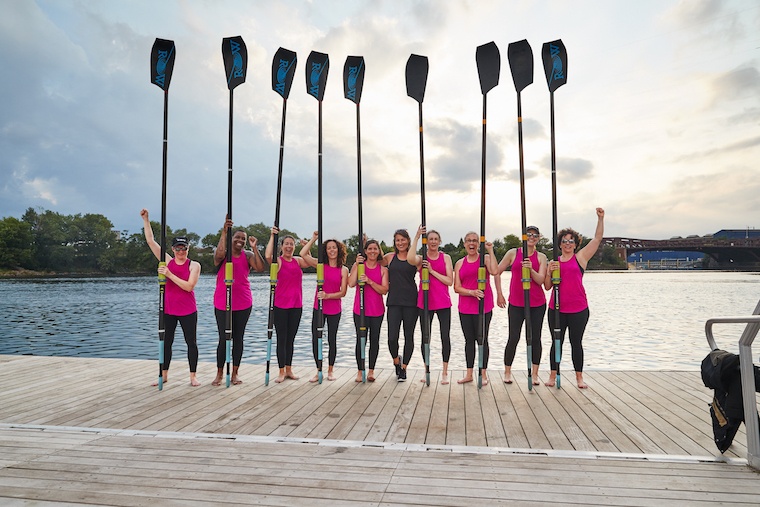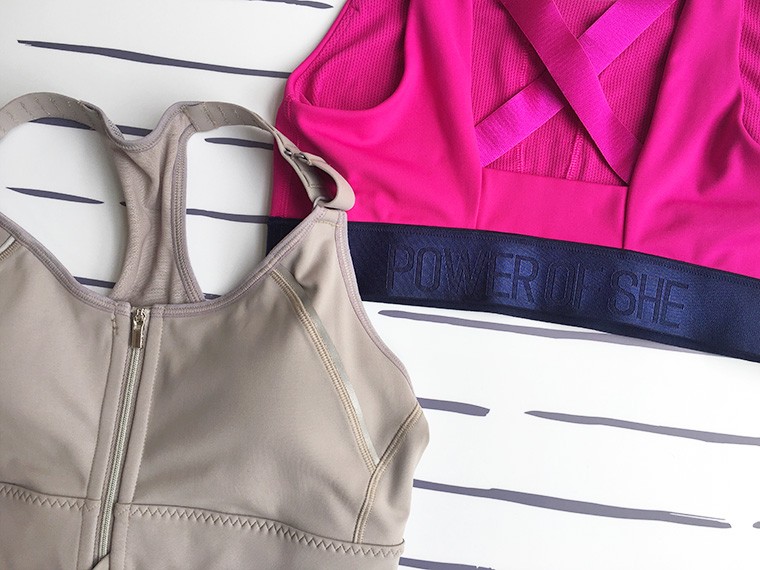The Major Way Athleta Is Helping Breast Cancer Survivors Get Back Into Fitness
When Mary Ridley was diagnosed with breast cancer in 2014, her mind was immediately flooded with a million thoughts. How would she find the right doctor? What was the right strategy to take? Why did this have to happen? Would she be okay? Overwhelmed, she called a friend who had the same diagnosis. Among her advice: Join a rowing club.
This wasn't just any rowing club. ROW (Recovery On Water) is a Chicago-based group just for breast cancer patients and survivors—no athletic experience necessary. You'd think adding rigorous rowing to a schedule now packed with doctors appointments and potentially debilitating treatment sessions would be the last thing to interest a patient. But Ridley and her friends at ROW all say it was the best thing they could have done.
Research has shown that exercising throughout treatment actually can lead to a faster recovery. And Athleta is making it a bit easier for survivors to stay active by releasing a sports bra designed specifically for post-mastectomy women, part of their latest Power of She initiative. The brand partnered with ROW for the campaign by featuring the members in its ads and is making a donation to the non-profit this month.
“Women were telling us that they’d been using Athleta bras as a post-mastectomy sports bra, but they couldn’t find a truly perfect option in the marketplace. We started to realize this was an underserved need,” says Sheila Shekar, Athleta’s senior director of brand marketing.

{{post.sponsorText}}
How did Athleta create a bra to support cancer patients and survivors' specific needs—and how is it changing women's lives? Keep reading to find out.

A different type of support system
Breast cancer is not the only—or even the main—topic the women of ROW talk about. On the surface, it's really like any other team: The women talk about their kids, work, what's going on at home. But they also can share tips on dealing with some of the side effects of treatment.
"My friend told me, 'Come meet the team because it's a great support system and we're doing this really cool sport,'" Ridley recalls of that life-changing phone call. "A lot of the women would calm my fears, or at least listen to me and know exactly what I was talking about. I am the type of person where I like having as much information as possible, and these women were so willing to share."
"There are things survivors understand that others don't, like suffering from survivors' guilt. Sometimes I think, 'Why didn't I die? Why am I here?'"
When Kym Reynolds was diagnosed, she learned she had a very aggressive tumor that progressed from stage one to stage three in a matter of weeks. "I made a decision two days later to get both of my breasts radiated because there was a 60 percent chance the cancer would come to my left breast, and I just couldn’t deal with having to go through it all twice," she says.
Now, four years later, she says her body has healed, but she'll always be in recovery. "There are things survivors understand that others don't, like suffering from survivors' guilt," she says. "Sometimes I think, 'Why didn't I die? Why am I here?' But you learn to persevere."
Members stay in ROW years after their treatment—some have been part of the organization for decades. "I remember [my first relay] was really, really hard," Ridley says. "But it was so gratifying because one of the other team members who had been on the team for nine years had breast cancer 20 years prior. It was a wonderful kind of affirmation. Twenty years ago she had breast cancer and here she was strong."

Designing the ultimate sports bra for survivors
Rowing is a vigorous sport even when your body is in tip-top shape. Imagine doing it after chemo. "You actually feel [better]," Ridley says. For her, it was mentally a game-changer. "When you get a cancer diagnosis, you feel like you've lost control," she says. "I was so pissed off because I wasn't the right demographic for it. I eat right. I exercise. I do all the right things, yet I still get this disease. You don't have control over that, but you do have control over starting something new. This is a very challenging sport and the sense of having control over my body to do it really helped me."
Studies have shown that breast cancer survivors who exercise may live longer, better-quality lives than those who don't. But after surgery, scarred breast tissue can be super sensitive—not exactly conducive to pulling any old sports bra over your head. Real talk: Sometimes it's a struggle for anyone to get out of one after a workout. When it came to designing the Empower Bra, Athleta went straight to survivors for input. "Unfortunately, breast cancer is [so common] that everyone knows someone who was affected, so it wasn't hard to connect to people who would be wearing it," says Athleta's Pamela Meyers, who designed the bra.
"When you get a cancer diagnosis, you feel like you've lost control. This is a very challenging sport and the sense of having control over my body to do it really helped me."
One of the biggest features of the bra is that it has a stretchable pocket to hold a prosthetic (of almost any size). The straps are also adjustable, which helps even out the cups, something that's helpful especially for women who choose not to get reconstruction.
"What's really cool is that this bra has soft cups that you can just take out if you want and adjust the straps so it lies flat," says Jeannine Love, another ROW member, who chose not to get reconstruction. "A lot of other bras I've tried just assume there will be a breast there, but this one lies flat."
The bra is made of the same sweat-wicking material as Athleta's others, which means it lives up to the athletic performance standards you expect from the company, and features a zipper down the front to make it easier to take on and off. It's these thoughtful details that help eliminate one of the hurdles survivors face when attempting to stay active—making it easier for them to take control of their recovery.
"The whole purpose of the Power of She campaign is featuring real women and girls who live a healthy, active lifestyle making an impact on the world," says Shekar. "We're honored to tell their stories."
Speaking of breast cancer, knowing how to give yourself a proper exam is key to prevention and detection. Plus, find out if drinking in moderation helps or hurts your odds of getting it.
Loading More Posts...